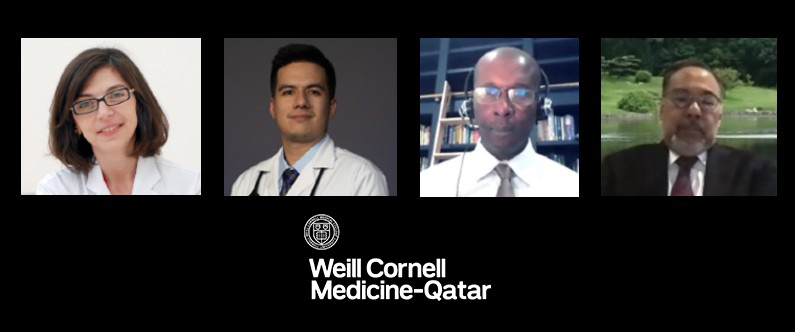WCM-Q course addresses perspectives on health equity
 Dr. Thurayya Arayssi, left, Dr. Bruno Mourao Pacheco, Dr. Damon Tweedy, and Dr. Arno Kumagai.
Dr. Thurayya Arayssi, left, Dr. Bruno Mourao Pacheco, Dr. Damon Tweedy, and Dr. Arno Kumagai.
WCM-Q’s division of Continuing Professional Development (CPD) held a course offering clinicians and educators a chance to learn different perspectives on health equity.
Health equity is a practice that prioritizes treatment and care based on need regardless of one’s social status. When health equity is achieved, everyone gets a fair and just opportunity to attain their highest level of health. The course helps the learners to develop the knowledge, skills, and competencies to support health equity.
Titled “Without Borders in Healthcare: Perspectives on Health Equity,” the one-day course gave the participants a platform to demonstrate awareness of social determinants of health and their impact on clinical care, medical education, and research; describe the current state of efforts to promote diversity, equity, and inclusion in healthcare; and identify how implicit bias is embedded in clinical care, medical education, and research.
The course was directed by Dr. Thurayya Arayssi, vice dean for academic and curricular affairs at WCM-Q, and Dr. Bruno Mourao Pacheco, WCM-Q alumnus, now a resident physician at Lifespan in Providence, Rhode Island, USA, who was also one of the speakers.
Other speakers included Dr. Arno Kumagai, professor and vice chair for education at the University of Toronto, Canada and Dr. Damon Tweedy, associate professor of psychiatry at Duke University School of Medicine, North Carolina, USA. Dr. Kumagai discussed equity and justice in healthcare in a topic titled “The Cutting Edge: Teaching for Equity and Justice in Healthcare,” while Dr. Tweedy addressed how racism disrupts equity in healthcare while giving a case study of race and America circa the 1950s and 1960s.
The session was aimed at physicians, nurses, pharmacists, dentists, allied health practitioners, students, researchers, and educators. The course was held under the umbrella theme of “Diversity, Equity and Inclusion,” which explores facets of clinical care, medical education, research, and community outreach with the aim of improving health equity when addressing underprivileged and vulnerable populations.
Dr. Mourao said: “The course aims to ensure that healthcare professionals are equipped to understand and address the main causes of health inequities, including racial and ethnic discrimination, education disparities, wage gaps, social environments, and other structural determinants of health. I am delighted to see clinicians and educators take part in the course which will be of benefit to the entire healthcare community. I am certain that with this kind of professional support, we will continue to help many healthcare professionals have a better understanding on health equity.”
In Qatar, WCM-Q is accredited as a provider of continuing medical education by the Department of Healthcare Professions (DHP) of the Ministry of Public Health (MoPH) and is accredited internationally by the Accreditation Council for Continuing Medical Education (ACCME).